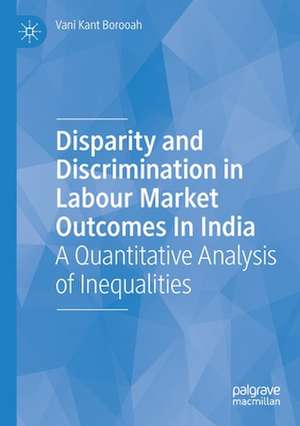Disparity and Discrimination in Labour Market Outcomes in India: A Quantitative Analysis of Inequalities
Autor Vani Kant Borooahen Limba Engleză Paperback – 14 aug 2020
“The author has done a service to this line of study by collating and analysing a novel dataset in a manner that is going to be of use for researchers of the labour market in India, a subject in need of critical enquiry.”
–Shanti Chakravarty, Professor of Economics, Bangor University, Wales, UK
This book deconstructs the dynamics of the job market in an emerging economy (India) that has vast capital resources, addressing a key concern in relation to inequality in the labour market by social groups. The author examines the changing impact of caste on employment opportunity using two sets of large databases, and extends this analysis into religious affiliation and gender. The findings in this book will be of importance to those working in both research and policy, and makes an important contribution through addressing the decomposition of inequality based on disparity and discrimination.
| Toate formatele și edițiile | Preț | Express |
|---|---|---|
| Paperback (1) | 448.97 lei 6-8 săpt. | |
| Springer International Publishing – 14 aug 2020 | 448.97 lei 6-8 săpt. | |
| Hardback (1) | 584.43 lei 6-8 săpt. | |
| Springer International Publishing – 18 iun 2019 | 584.43 lei 6-8 săpt. |
Preț: 448.97 lei
Nou
Puncte Express: 673
Preț estimativ în valută:
85.93€ • 89.47$ • 72.62£
85.93€ • 89.47$ • 72.62£
Carte tipărită la comandă
Livrare economică 10-24 martie
Preluare comenzi: 021 569.72.76
Specificații
ISBN-13: 9783030162665
ISBN-10: 3030162664
Pagini: 218
Ilustrații: XV, 218 p. 6 illus.
Dimensiuni: 148 x 210 mm
Greutate: 0.29 kg
Ediția:1st ed. 2019
Editura: Springer International Publishing
Colecția Palgrave Macmillan
Locul publicării:Cham, Switzerland
ISBN-10: 3030162664
Pagini: 218
Ilustrații: XV, 218 p. 6 illus.
Dimensiuni: 148 x 210 mm
Greutate: 0.29 kg
Ediția:1st ed. 2019
Editura: Springer International Publishing
Colecția Palgrave Macmillan
Locul publicării:Cham, Switzerland
Cuprins
1. The Labour Market in India.- 2. Labour Market Inequality.- 3. Discrimination and Jobs Reservation.- 4. Caste, Gender, and Occupational Outcomes.- 5. Job Contracts.- 6. Wage Inequality.- 7. The Way Forward.
Notă biografică
Vani Kant Borooah is Emeritus Professor of Applied Economics at the University of Ulster, Northern Ireland, and a member of the Royal Irish Academy. He has been President of the European Public Choice Society and of the Irish Economic Association. Past books include Health and Well-Being in India (Palgrave Macmillan, 2018), The Progress of Education in India (Palgrave Macmillan 2017), Votes, Parties and Seats (Palgrave Macmillan, 2016), Europe in an Age of Austerity (Palgrave Macmillan, 2014) and Growth, Unemployment, Distribution and Government (Palgrave Macmillan, 1996).
Textul de pe ultima copertă
“The author has done a service to this line of study by collating and analysing a novel dataset in a manner that is going to be of use for researchers of the labour market in India, a subject in need of critical enquiry.”
–Shanti Chakravarty, Professor of Economics, Bangor University, Wales, UK
This book deconstructs the dynamics of the job market in an emerging economy (India) that has vast capital resources, addressing a key concern in relation to inequality in the labour market by social groups. The author examines the changing impact of caste on employment opportunity using two sets of large databases, and extends this analysis into religious affiliation and gender. The findings in this book will be of importance to those working in both research and policy, and makes an important contribution through addressing the decomposition of inequality based on disparity and discrimination.
Caracteristici
Provides a comprehensive account of India's labour market Focuses on salient features of labour outcomes such as occupation and wages Results are based on a detailed, multivariate, analysis of survey data from two reputable sources pertaining to the same time period: the Indian Human Development Survey (IHDS, 2011) and the National Sample Survey (NSS, 2011-12)
